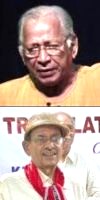HEMANTA RITU - PRE-WINTER ISSUE NO. 124 (Nov-Dec 2025)
This special feature on contemporary Assamese writing presents worldviews across different genres – poetry, prose and fiction – including tributes to Zubeen Garg and Anubhav Tulasi. Readers will find cause to engage with interesting reading that will provide a sense of the culturally rich and textured fabric of Assamese literature in dialogue with the world today. Curated by Prof. Bibhash Choudhury, the feature showcases ‘writings that reflect both societal questions and structures of representation. Poetic ventures of several practitioners present articulations that are earthy in orientation with a focus on the materiality of language.’

“After Bharat Ratna Dr Bhupen Hazarika, it was Zubeen Garg (pic) who introduced the rich heritage of Assamese music and culture, as a whole, to the global audience. Zubeen’s songs are based on the traditional culture, yet they are replete with a contemporary style. … He brought about a cultural revolution through music.” - Ananya Hiloidari in her tribute. (FEATURE)

“Both as an experimenter and as a practitioner, Anubhav Tulasi (pic) broke new ground in contemporary Assamese poetry. In every collection, he sought to invigorate the possibilities of poetic expression in ways that had not many treading such pathways earlier. … (His) works will remain a testament to the promise and potential of contemporary Assamese poetry.” – Bhaskar Jyoti Nath in his tribute. (FEATURE)

You have a Special is on the Bhubaneswar “Symposium on Indian Literature in Translation” (28 June 2025) with papers by eminent & prolific litterateurs like Prof. Santanu Kumar Acharya (former Registrar, Utkal University; above in the pic), and Dr Hrusikesh Panda (IAS topper, 1979; below in the pic)—jointly organised by Sahitya Akademi and Kunja Bihari College. (LITERARY SECTION)

“By chronicling the erosion-driven erasure of a village, Bora’s narrative offers an intimate counterpoint to the abstract language of climate policy, revealing how environmental degradation is lived, narrated, and memorialized in local cultures”— Ayush Gaur (in the pic) in his—Reading Flood, Memory, and Managed Retreat in Jayanta Madhab Bora’s ‘Moriahola’. (LITERARY SECTION)

‘Survival’ is the story of an elderly Neurologist facing a grim future, unable to cope with technological changes in his field. His chance talk at a school function, advising students to stay away from Generative AI for the potential harm it causes to young minds, finds resonance with parents, and soon his ideas gain wide popularity on social media, making him a celebrity and a much sought-after speaker. Read the well-crafted story by Deepika Bhatia. (FICTION)

Kanjiamma is a child-widow shunned by her in-laws and her own people. Pining for love and affection, she runs away to Nilgiris at 18, to rebuild her life as a Tea-seller at a roadside shop. The wholehearted support and acceptance of the girl by the people at the new place bring back dignity and affection into her life. She finds freedom and emancipation there. Fiza Parveen weaves the heart-warming story, ‘Kanjiamma Unbound’. (FICTION)

Aditi Dasgupta’s poems bring to the surface what the heart feels. They do not try to water it down but become active observers of how the world works. (POETRY) Aditi Dasgupta’s poems bring to the surface what the heart feels. They do not try to water it down but become active observers of how the world works. (POETRY)

Sudha Padmaja Francis’s poems smell of quiet rebellion, and rightly so. Their words evoke a sense of standing up rather than falling apart, pushing their way out of the clutches of suffocation. (POETRY)

Pankajam Kottarath (in the pic), reviewing ‘Wayward Waves, Reluctant Ripples’ by Dilip Mohapatra, notes how the poems move from war to resilience, blending satire and grief with lyrical depth. (BOOK REVIEWS)

Sanjay Kumar Sarkar (in the pic), reviewing ‘Animal Poetics and Literary Thinking’ by Ratul Nandi, highlights how literary form resists closure, treating the animal as a companion in thought and staging ethical opacity. (BOOK REVIEWS)
SPONSORSHIP INVITE
Muse India, sustained for over 20 years by the goodwill of Members and the voluntary work of the entire Muse India team, invites you to this exciting journey by sponsoring an Issue. More details at 'Support Muse'.
ANNOUNCING
Submissions Invited for MUSE INDIA TRANSLATION AWARD 2025 Last date for submissions: Dec 20, 2025 For further details, Click Here
Past Issues
Issue:123:Contemporary Indian English Novel
Issue:122:Adivasi Poetry
Issue:121:Punjabi Literature in Prospect
Issue:120:Kashmiri Literature Today
Issue:119:Film & Other Media Adaptations from Regional Literatures
Issue:118:The life & work of ‘Padma Shri’ Asavadi Prakasa Rao, a unique Telugu savant with subaltern roots
Issue:117:Westerners’ Encounters with Indian Philosophy and Spirituality
Issue:116:Writings of Anita Desai